Daily chronicle – 3rd day of the Leadership School
By Julie Bu Daher & Laura Infante Blanco
The session started with a keynote presented by Francois Bouchet from LIP6 UPMC. He started his talk by describing the evolution of classrooms and their environment, from old classrooms to modern ones, the latest still using old practices and lacking most of the modern technological devices.
He explained the connection of Artificial Intelligence (AI) to teaching and learning, its risks, impacts and ethics. He confirmed that the goal behind this innovation is not replacing the teachers but giving them more power that makes learning more flexible, personalized and engaging.
He stressed the importance of AI in the domain of education. It is artificial intelligence and learning sciences to promote adaptive learning environments. Its goal is to open the blackbox of learning using theories, building models (pedagogical, domain, learner models…), process with algorithms, testing and iterating. It is important to have the learners, teachers and parents involved in the co-design of the next AIED systems to meet their needs.
He described the current uses of AI in education as intelligent tutoring systems, intelligent support for collaborative learning, and intelligent virtual reality. He also described the future uses of AI in education toward better understanding of the best teaching approaches and its challenges in developing reliable indicators to track process. Finally, he discussed the ethical problems of data collection and algorithms. He lastly highlighted the importance of sharing but keeping ethics in mind
In Virtual Hospitals, Tran Nguyen (University of Lorraine) talked about simulation learning environments for surgeons. He started expressing his concern about educational methods in surgery, where there is one master for many students, an area where the best learning method still remains the one to one model. And the most important premise in this domain is that “never do it for the first time in a patient”. As a result of this, the use of AI to build new simulators for training the future surgeons is of an extreme urgency. Many technological advances have been already achieved in the medical field i.e. pedagogical platforms for cardiovascular interventions, mini-invasive endoscopy, ophthalmologic interventions, etc. But there is still a lot of work to do in this field to support learning and training tasks of the future medical doctors.
The panel was closed by Slim Ouni (University of Lorraine) who talked about Language Learning.
His research focuses on the impact of the visual channel on perception of language. He illustrated this in an interactive manner, making us listen three times to the same phoneme with three different faces pronouncing the sound. Obviously, we were all tricked, with no exception. Slim is using modern AI techniques to collect and treat speech articulation data, in order to be able to reproduce accurately face movements with multiple purposes such as learning foreign languages or hard of hearing assistance.He insisted that the functional future devices don’t pretend to replace language teachers but to assist them in improving students pronunciation. He showed us a short video of the first results, in the form of an amazing virtual face pronouncing sounds.
The final talk was for Larry Cooperman, Associate Dean of Open Education at University of California, Irvine.
He gave a brief description of his high ranked university and discussed its strategic plan and goals to utilise modern technological tools to create most effective learning environments, to encourage distance education, massification and digital transformation. He then presented the OpenChem project which provides a full curriculum of recorded lectures covering undergraduate chemistry plus selected graduate topics. Through lecture videos and ancillary materials, anyone can view complete undergraduate core and elective course lectures delivered by top faculty members. He confirmed that data can’t always detect what will happen in the future as there are changing demographics.
Finally he discussed what has to be changed as administrative structures, evidence-based research on teaching and learning, experimentation of new models or educational materials.
Keywords: AIED, algorithms, data analysis, data ethics, learning environments, MOOC, Simulation
Tips of the day:
- AI techniques can help to develop powerful tools to improve the learner’s experience, and they are becoming indispensable; however ethics should always be taken into consideration when collecting and sharing data.
- The aim of digital transformation is not to replace teachers, but to help them in facilitating the learning process and making it more effective
- Particular domains in education need a big effort to help learners to achieve their goals, like in the medical field or the language acquisition.
- AI is revolutionizing education tasks but there are many aspects which have to change or improve in order to continue in the right direction: administrative structures, evidence-based research on teaching and learning, experimentation with new models, educational materials & digital technology to shift educational spaces.
‹ Daily chronicle – 2nd day of the Leadership School Daily chronicle – 4th day of the Leadership School ›

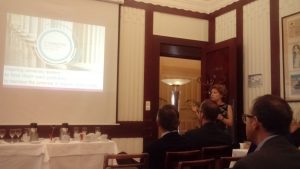

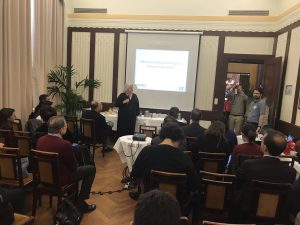
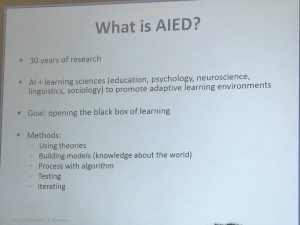
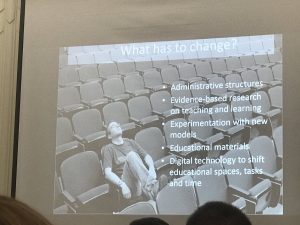
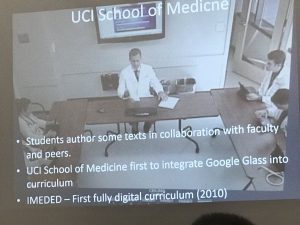
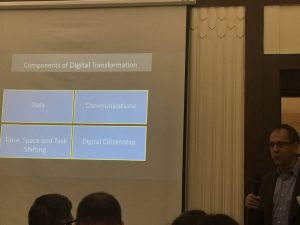
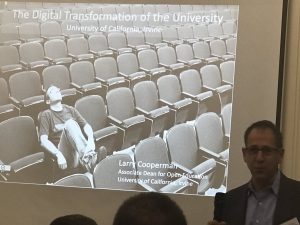
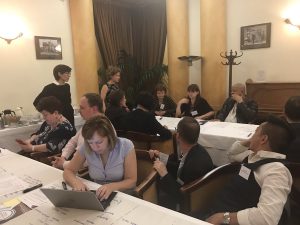
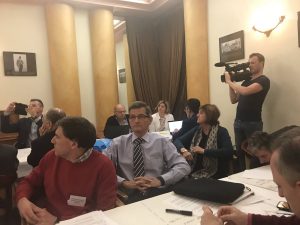
Comments are currently closed.